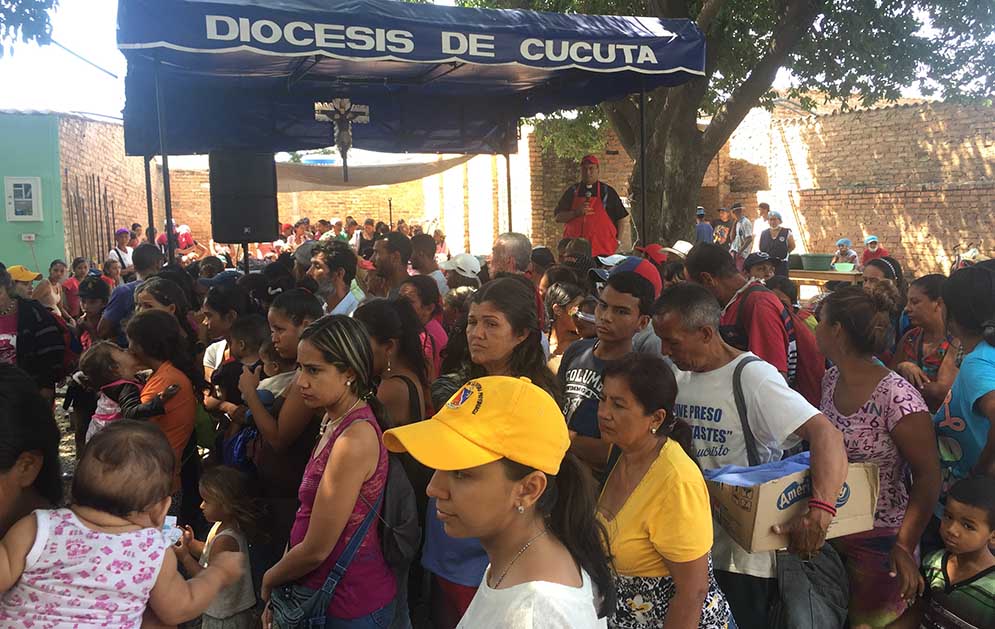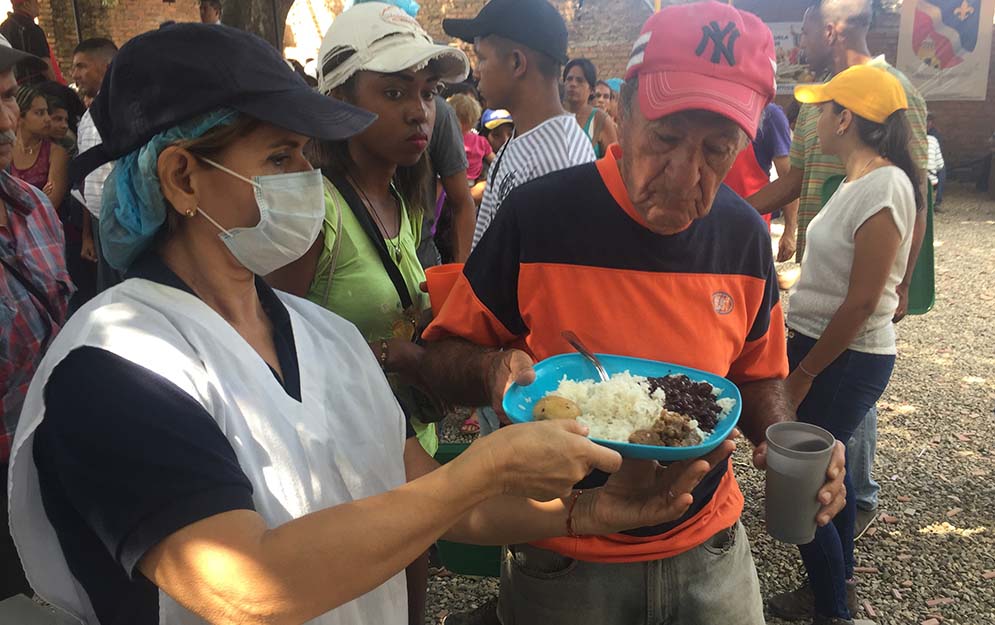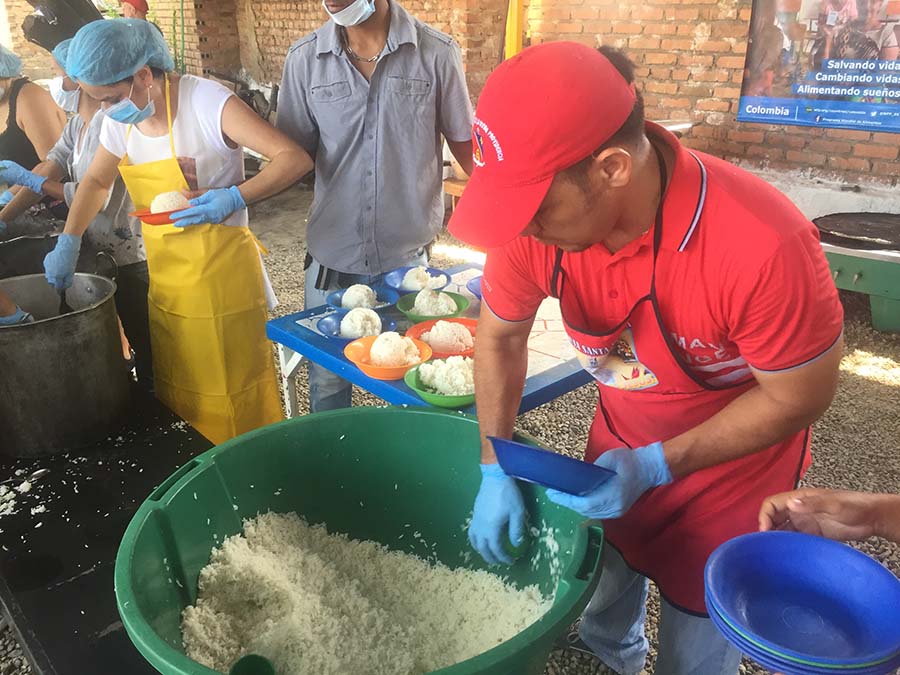
A crowd waits to be served at the Divina Providencia food kitchen in Cucuta, Colombia. (Cody Weddle)
By crossing the border from her home in Venezuela into Colombia, Yessica Perez can sometimes make $10 a day cleaning houses, enough to feed her disabled husband and two teenage daughters. But she only has stable work two days a week, meaning she struggles to reach the $10 mark daily.
When she does come up short, she and her daughters turn to a soup kitchen overseen by the diocese of Cucuta, Colombia, the border town where she works.
She treats the help offered by the church as a last resort because "if I have a good day, I shouldn’t take food away from somebody else who needs it."
And thousands of other Venezuelans do need the help in Cucuta, a town of about 640,000 that sits on the Venezuelan border. Since June 2017 the church-run soup kitchen has been serving free lunches to 1,000 Venezuelans daily and providing temporary shelter for up to 300.
Located less than a mile from the bridge that marks the border, some arrive here just for the lunch before heading back to Venezuela. Some live and work in Cucuta. Others drive up to four hours from Venezuela for the lunch. Highly subsidized fuel in Venezuela makes the feat possible.
"They leave the car over there and just walk here," said Fr. Jose Cañas, who oversees the soup kitchens.
The efforts by Cañas and the church aim to help those fleeing the neighboring country’s economic collapse, where some estimate inflation last year reached 2,616 percent. A system of ever-changing currency controls has resulted in shortages of basic foods and medicines in traditional grocery stores and pharmacies. The minimum wage equates to just $4 a month using the black market exchange rate.
That steadily deteriorating humanitarian situation in Venezuela has provoked an equally steady exodus of refugees, with hundreds of thousands turning to nearby Colombia.
The responsibility to help them is a "mandate from Jesus and the Gospel," according to Cañas.

50 volunteers help daily to serve roughly 1,000 lunches to Venezuelans in need in Cucuta, Colombia. (Cody Weddle)
"Following an invitation from the pope to help Venezuelan migrants, to help our Venezuelan brothers, we rented this space, knowing that this area was the neediest," he said.
The area consists of a recreational field behind a building on a side street. Nearly 50 volunteers stir giant vats of beef stew and rice, while others prepare each plate. Portable tents provide shade while the Venezuelans, eating at picnic and plastic tables and chairs, share stories about how they ended up in a situation they never imagined.
Many like Jakseli Orellana, who arrived four days prior, are recent arrivals. As she feeds her three-year-old daughter Daniela Fernandez, she ponders whether to stay in Cucuta or move back to Barquisimeto, Venezuela.
"[Daniela] doesn’t want to eat, the mosquitos are biting her, and she cries all the time," Orellana tells NCR.
Cucuta has one of Colombia’s highest rates of unemployment, and many locals struggle to find work themselves. It leaves few opportunities for the arriving Venezuelans. Like many here, Orellana would prefer to move on to a different city in Colombia or another country, but she could just barely afford the bus ticket to Cucuta.
Orellana brought dozens of bottles of hot sauce, soy sauce, and garlic sauce to sell on the streets. Her husband bought the items in Venezuela and she can sell them for a considerable markup in Colombia.
She managed to pay for a hotel for two nights, but slept with her daughter in the streets for the other two nights, causing her to consider heading back home.
"It's difficult here; it’s difficult there, but there we have somewhere to sleep," she said.
The influx of Venezuelans has strained local resources in the town, leading many in the community to call on stricter controls at the border.
Relations between some locals and the homeless Venezuelans living in public spaces reached a boiling point in late January when authorities evicted and deported hundreds of Venezuelans living in a park that some had termed "hotel Caracas."
Jose Contreras, the president of a local community organization that monitors the park, claimed the Venezuelans had installed "an empire."
"It was fine until they started to charge fees to use the park," he said. "A few of them ruined it by selling drugs."
The arrival of Venezuelans has also affected the local hospital, where the director says they’re operating at 130 percent capacity. Beds fill the hallways of the crowded emergency room, many of them with Venezuelans who won't be able to pay for their care.
Director Juan Agustin Ramirez says that since August 2015 the hospital has treated more than 8,700 Venezuelan patients free of change and that they are "overwhelmed" and "without the appropriate infrastructure to attend to so many patients."
While visiting Cucuta on Feb. 8, Colombian President Juan Manuel Santos promised to beef up security at the country's border, announcing plans to send thousands of troops to prevent illegal crossings.
On the same day Brazilian Defense Minister Raul Jungmann announced plans to send more troops to the Venezuelan border and transport thousands of Venezuelans in border towns to other parts of the country. Both countries will carry out a census to determine the number of Venezuelans in their country.
The situation has even led Santos to request foreign assistance in dealing with the Venezuelan refugees.
Santos also declared that Colombian immigration would no longer issue temporary border crossing cards, meaning Venezuelans wishing to enter Colombia will need a passport when their cards expire. Because materials to make passports are also in short supply in Venezuela, obtaining one can take months and entails a trip to the capital Caracas and entire days waiting in lines.
The new policies could prevent Venezuelans from making daily trips to the soup kitchen, but they could also affect thousands of Venezuelans who live in Venezuela but work in Colombia, like Perez.

Volunteers scoop rice from a giant container to serve the Venezuelans arriving daily. (Cody Weddle)
Perez lives in San Antonio de Tachira, Venezuela, where she worked in a school cafeteria, but she was earning less than 50 cents a day. A year ago she left the cafeteria job to make the daily trip to Cucuta to clean houses. Now she will have to decide whether to remain in Venezuela or permanently move to Colombia.
Those who arrive without work sell coffee, bread, cigarettes, candy, or other small items in plazas and parks. In some areas hundreds of Venezuelans sell the same items side by side.
Irene Tirsoi and Camina Chasoi came to Cucuta early February from Caracas and eat daily at the free soup kitchen. Ethnically part of the Inga indigenous tribe in southern Colombia, but born in Caracas, they now sell small artisanal bracelets and jewelry in Cucuta.
Indigenous peoples from Venezuela and Colombia have long sold crafts on the streets of major Venezuelan cities, but today Chasoi and Tirsoi make more in one day than they did in Caracas in 15 days.
"And there we can’t find food, medicines, nothing," said Tirsoi.
Advertisement
Cañas estimates that the kitchen only serves up to one percent of Venezuelans in need in Cucuta and the surrounding areas. While he would like to provide more assistance, the program relies on private donations and limited funds from Caritas Colombia.
As the last Venezuelans left the soup kitchen, Cañas greeted a group of United Nations representatives, briefing them on the church’s work in Cucuta and its shortcomings. As they spoke, three new arrivals from Venezuela waited outside, hoping to find a place to stay for the night.
Among those seeking shelter was 20-year-old Jose Perez, who the week before had dropped out of college. He took a bus to the border, crossed over into Cucuta and was hoping not have to sleep in the street for the first time in his life. The next day he planned to continue to Medellin.
"I'm not scared," he said, tearing up and rubbing his eyes. "I don't have an option."
[Cody Weddle is a freelance journalist based in Caracas, Venezuela. Follow him on Twitter: @coweddle.]








